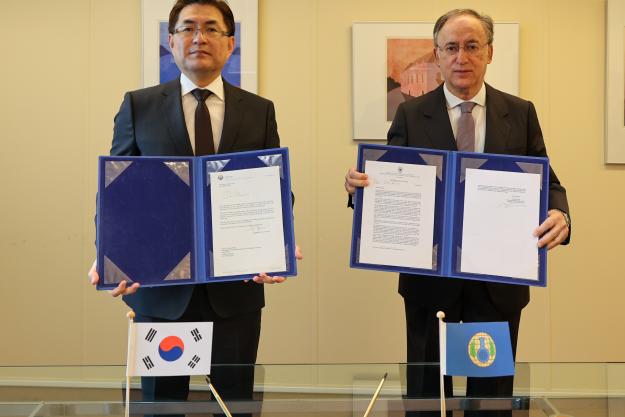The Government of the Republic of Korea has contributed additional €113,466 to a special Trust Fund of the Organisation for the Prohibition of Chemical Weapons (OPCW) to support the construction and operation of a new facility, the OPCW Centre for Chemistry and Technology ("ChemTech Centre"), currently being built outside The Hague.
The contribution was formalised during a ceremony between the Permanent Representative of Korea to the OPCW, H.E. Ambassador Yeondoo Jeong, and OPCW Director-General, Ambassador Fernando Arias, held yesterday at OPCW Headquarters in The Hague.
Ambassador Yeondoo Jeong stated: "As threats emanating from developments in the field of chemistry and science and technology are steadily evolving, States Parties and the OPCW should make their utmost efforts to prevent the re-emergence of chemical weapons. In this spirit, the new ChemTech Centre will play a crucial role in ensuring that the OPCW keeps up with new and emerging challenges to the Chemical Weapons Convention and in further enhancing capacity of all States Parties and the OPCW. As the first State Party to have made voluntary contributions to the ChemTech Centre Project in 2017, the Republic of Korea will maintain its unwavering support to the endeavours to strengthen the international norm against the use of chemical weapons."
The Director-General expressed: "I am deeply thankful to the Republic of Korea for its steadfast and continuous support to the ChemTech Centre from the beginning of the project. This new facility will bolster research, analysis, trainings and the international cooperation and assistance provided by the OPCW, underpinning its central role in chemical non-proliferation and disarmament, peaceful and authorised uses of chemistry and chemical safety and security."
Director-General Arias additionally expressed his gratitude to the OPCW States Parties and other donors who supported the project and encouraged continued participation in this important initiative. He further emphasised the role the new ChemTech Centre will play in strengthening the OPCW's ability to address chemical weapon threats and enhance capacity building activities to the benefit of all 193 OPCW Member States.
The ChemTech Centre Trust Fund remains open for further contributions. Additional funds will provide extra assurance for the successful completion of the project and for projects to be carried out at the Centre once the building is operational.

Background
The project to build the ChemTech Centre seeks to strengthen the OPCW's capabilities to fully address new and emerging chemical weapons threats, as well as to support capacity building in OPCW Member States. The current OPCW Laboratory and Equipment Store are central to the effectiveness and integrity of the verification regime of the Chemical Weapons Convention, and they also contribute to the OPCW's capacity building and international cooperation activities. However, the current facility will soon no longer be fit-for-purpose due to its ageing infrastructure, space constraints, larger workloads, and new missions with new areas of work.
A new facility is required to meet the demands of OPCW Member States for enhanced verification tools, improved detection capabilities and response measures, as well as increased capacity building activities. The ChemTech Centre will also help the OPCW to keep pace with developments in science and technology and new chemical weapons threats. Construction of the ChemTech Centre started in June 2021 and is planned to be finished by the end of 2022.
To date, the following Member States have contributed or pledged to contribute to the project: Algeria, Andorra, Angola, Australia, Bangladesh, Belgium, Canada, Chile, China, Cyprus, the Czech Republic, Estonia, Finland, France, Germany, Greece, Hungary, India, Indonesia, Ireland, Italy, Japan, Kazakhstan, Lithuania, Luxembourg, Malaysia, Malta, Mexico, Morocco, the Netherlands, New Zealand, Norway, Pakistan, Panama, Peru, Philippines, Poland, Portugal, the Republic of Korea, Romania, San Marino, Saudi Arabia, Slovakia, Slovenia, Spain, Sweden, Switzerland, Thailand, Turkey, United Arab Emirates, the United Kingdom of Great Britain and Northern Ireland, and the United States of America. The European Union, Israel (a signatory state) and other donors have also contributed.
As the implementing body for the Chemical Weapons Convention, the OPCW, with its 193 Member States, oversees the global endeavour to permanently eliminate chemical weapons. Since the Convention's entry into force in 1997, it is the most successful disarmament treaty eliminating an entire class of weapons of mass destruction.
Over 99% of all declared chemical weapon stockpiles have been destroyed under OPCW verification. For its extensive efforts in eliminating chemical weapons, the OPCW received the 2013 Nobel Peace Prize.






